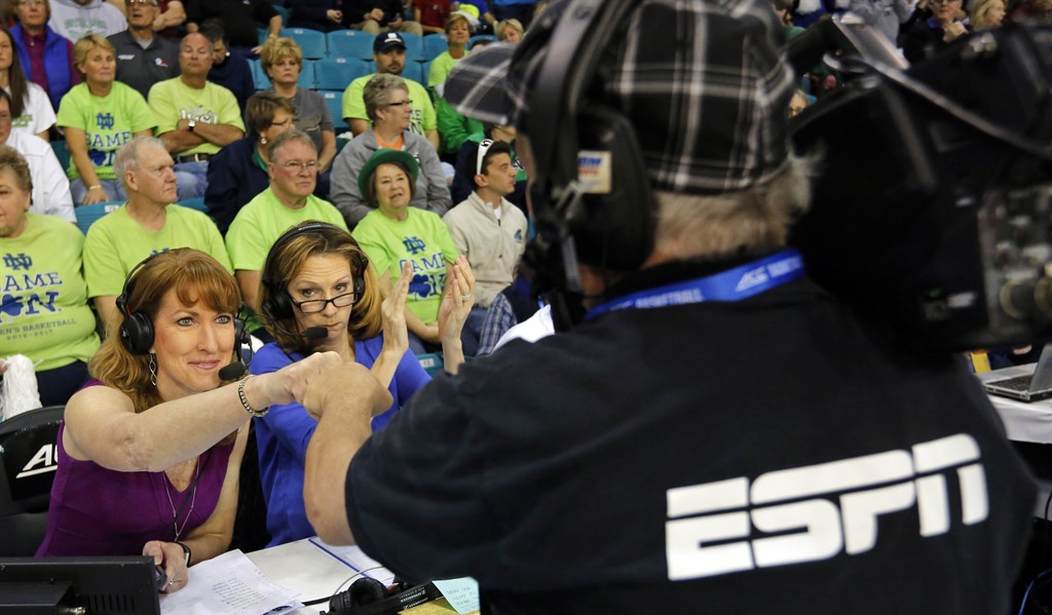By this time, most of you have probably already heard that ESPN laid off a hundred people this week, primarily from web side of the business. It’s been no secret for a while now that the network has been losing money and driving their new owners at Disney rather crazy by failing to meet financial forecasts. If you ask the tech sector experts they still seem to think that it’s just a natural result of the changing media landscape. People are cutting the cord and getting their sports news from other sources. They can watch highlights of all the games on YouTube, participate in interviews on social media and generally don’t have to wait for SportsCenter to get around to covering their particular area of interest.
I won’t deny that’s probably part of it. John Walters at Newsweek has an interesting take on the subject this week, opining that viewers should have seen trouble on the horizon as soon as the network added a “crawl” at the bottom of the screen. That was the beginning of the end.
The crawl did not directly lead to the termination of all those staffers on Wednesday, but it was the genesis of how and why ESPN finds itself in such disarray. Getting the crawl is the first step in understanding how ESPN began to vape away its integrity, abandoning its mission in order to follow the same ratings-obsessed format of MTV. The crawl represents ESPN’s first concession that there were exterior market forces at work to which it was not immune, and yet as the rural Connecticut-based cable sports network transformed itself into a worldwide brand, it ignored the lesson of the crawl. In sports parlance, ESPN neglected to protect its blindside.
The crawl undermined the stars of ESPN, the SportsCenter anchors, in every sense. Viewers had always tuned into ESPN’s flagship program primarily for scores and highlights—the witty banter and comity between co-anchors, the catchphrases (“It’s deep, and I don’t think it’s playable!”) and the adroitly written copy, penned by the on-air personalities, were always appreciated. But they were never essential.
That’s fair enough I suppose. We are now a society obsessed with instant gratification and are largely capable of satisfying those urges. If a television show covering any sort of news is going to hit seven stories in a half hour segment they’re only going to talk about one at a time. If you’re waiting for NBA scores and they’re talking about golf you can readily hit the web and get what you’re looking for.
But are we really going to ignore the elephant in the room? ESPN became more and more politicized over the past year, having a definite leftward spin to it. Most of the executives there either don’t want to talk about it or dismiss it as a non-factor, but Linda Cohn, one of the anchors on SportsCenter, admitted as much this week. (NY Post)
The network may be losing the subscriber revenue not just because of cord-cutting, Cohn allowed, but because viewers are increasingly turned off by ESPN inserting politics into its sports coverage.
“That is definitely a percentage of it,” Cohn said Thursday on 77 WABC’s “Bernie and Sid” show when asked whether certain social or political stances contributed to the stupor that resulted in roughly 100 employees getting the ax this week. “I don’t know how big a percentage, but if anyone wants to ignore that fact, they’re blind.”
Cohn described Roger Goodell, Colin Kaepernick and Caitlyn Jenner as all being “polarizing figures” in the sports world. That’s a given, but in some ways I have to feel sorry for ESPN here. They’re a sports network, so how in the world would they completely ignore a story as big as Kaepernick’s National Anthem protests? But the flip side of that coin is that they could readily have taken more of a we report, you decide approach and not gone in so whole hog in support of him.
Some of the high level staff at ESPN saw this coming, though they apparently weren’t given much of a voice in the network’s strategic planning. ESPN’s public editor, Jim Brady, said back in November, “Internally, there’s a feeling among many staffers — both liberal and conservative — that the company’s perceived move leftward has had a stifling effect on discourse inside the company and has affected its public-facing products. Consumers have sensed that same leftward movement, alienating some.”
Ya think, Jim? But I’ll at least go so far as to agree that you can’t place all of the blame on either of these factors because they both played a role. The media marketplace is evolving and traditional broadcast playbooks don’t work anymore. The overwhelming flood of options which consumers have available to them is making it harder and harder for traditional network models to dominate the marketplace and everyone’s share of the pie is contracting in response. But the politicization of a sports based franchise was a completely avoidable, self-inflicted wound. Sadly for ESPN, it’s probably too late to recover from that one because they’ve now managed to re-brand themselves a “a liberal outlet” and that’s just going to turn off a significant portion of their target audience.








Join the conversation as a VIP Member